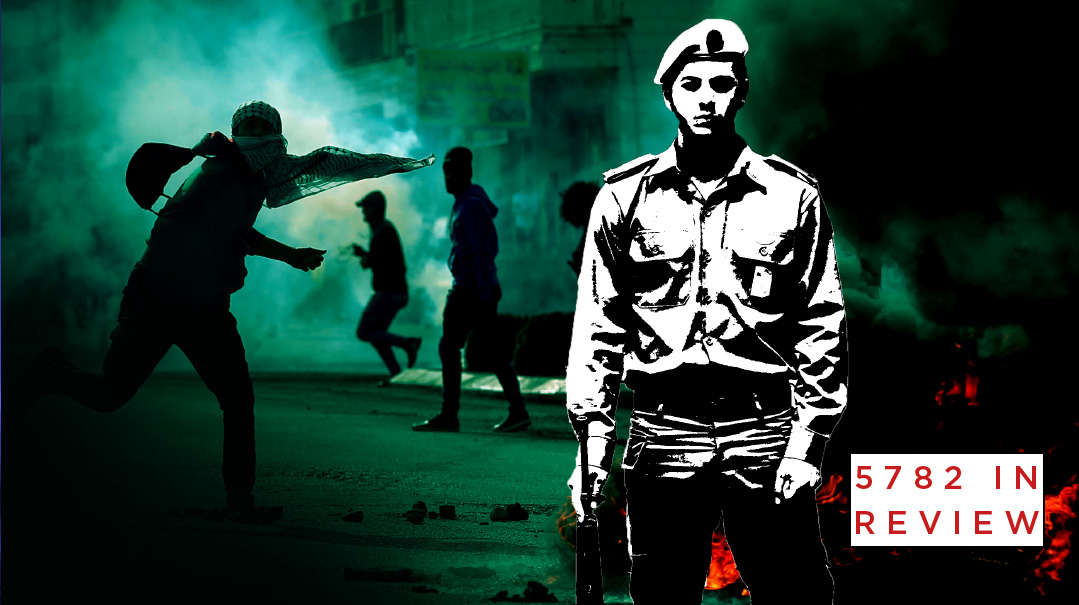Right Down the Middle

What's next for Israeli politics?

Two axioms of recent Israeli politics were corroborated in last week’s election: that Benny Gantz can’t form a government without the Arab Joint List, and Likud challenger Gideon Saar’s thesis that the right can’t reach a 61-seat majority with Binyamin Netanyahu at its head.
As of this writing, Israel’s political deadlock is ongoing, the political establishment is in total disarray, and no one has a solution. The Israeli public turned out to vote with surprisingly high participation of 71.5%, more than in either of last year’s elections. Despite that, Israel remains split right down the middle. Those who voted for the left, Lieberman, and the Arab Joint List want to see Netanyahu gone. Netanyahu, meanwhile, shored up his position within the right-wing bloc. The problem is, his best effort brought him up three seats short of forming a government.
Theoretically, Gantz could form a minority left-wing government of 47 seats (33 Blue and White, seven for Lieberman, and seven for Labor-Gesher- Meretz) with outside support from the Arab Joint List’s 15 seats, who would block any no-confidence motions. If Gantz could pull that off, it would be the first time in Israel’s history that a government was dependent on the Arabs.
The key figure is still Avigdor Lieberman of Yisrael Beitenu. Lieberman, who attacked the Arab Joint List throughout the campaign, surprised many when he expressed willingness to recommend Gantz for prime minister in the current round of consultations with the president.
Lieberman told his followers, “What’s most important now is to make sure Gantz is tasked with forming a government, to replace the speaker [Yuli Edelstein of Likud], and take control of the Knesset Arrangements Committee — then things will start moving on their own. Our goal is to form a government as soon as possible and send Netanyahu to collect his pension.”
The minority government idea depends largely on two right-wing Blue and White MKs, Yoaz Hendel and Zvi Hauser. Last time around, they opposed a coalition with the Arabs and blocked the initiative. But they could agree to it this time, given that the chareidim have doubled down on their pledge not to sit with Yair Lapid. The political establishment consensus is that Yisrael Beitenu will support a law disqualifying Netanyahu from serving as prime minister and then try to force a unity government between Blue and White and the Likud, with Gantz serving as prime minister the first two years and the next Likud leader filling out the rest of the term.
Some in Likud say Netanyahu would be wise to seek a plea bargain in his upcoming corruption trial, to avoid the risk of jail time. They explain that Netanyahu now needs not just one or two deserters from across the aisle to form a governing majority, but a small political earthquake. An entire party would have to cross the lines, and Amir Peretz of Labor has been identified as one who might take the plunge. In politics nothing can be ruled out, but that scenario looks completely unrealistic for now. Peretz is digging in his heels, and Labor members are filled with deep-seated loathing for Netanyahu.
The sense of a missed opportunity is even stronger considering the Likud’s amazing achievement. Who thought that Netanyahu’s tremendous victory in the form of 36 Likud MKs would be canceled out by Arab Joint List gains with a record 15 seats?
The entire Arab bloc — funded by foreign countries and hostile foundations —set itself a very clear goal: stop Trump’s peace plan by any means possible. By all appearances, they’ve achieved that. Never before has an anti-Zionist force in the Knesset had such a powerful say in forming a government.
For Netanyahu, it’s an enormous disappointment. He succeeded in rallying the right-wing base, and won 100,000 new voters for the Likud — but the opposing bloc proved just as determined.
And so, the country is again paralyzed, just as the coronavirus has reached Israel. The situation is worsening by the day, and could soon become a national emergency. Countless flights canceled, damage to the tourist industry, and an enormous setback for the Israeli economy. The Health Ministry is considering quarantine measures for people returning from several American states where the virus seems to be spiraling out of control. The world may be facing the worst pandemic since 1918.
On March 16, the 23rd Knesset will be sworn in. Netanyahu will be there to rise to his feet when President Reuven Rivlin is announced. The next day, March 17, he’ll be in Jerusalem district court to rise to his feet when his judges are announced. More than one day and a few kilometers separate the Knesset and that courtroom: Here he’s a prime minister whose word is law, there he’s a criminal defendant.
Chareidim Just Holding Steady
Did the elections to the 23rd Knesset yield the coveted results for the chareidi parties? The simple answer is that Shas and United Torah Judaism each remained confined to its natural base.
Shas battled for every vote, even among demographics that historically vote for other parties, such as Chabad and working chareidim. The goal was not to outdo UTJ but to help Netanyahu form a government. Shas made a tremendous effort, but ultimately only retained the nine seats it won in September. Party officials say that although Netanyahu siphoned off some Shas votes, they still managed to increase the right-wing vote pool.
United Torah Judaism also remained stagnant, at seven seats. The two factions, Degel HaTorah and Agudas Yisrael, ran separate campaigns and had little presence on the ground.
Degel MK Uri Maklev says the focus was on producing actual voters, not colorful posters. “The fact is that UTJ won around 275,000 to 280,000 voters, as opposed to 268,750 in the last elections. Which means growth of 5,000 to 10,000.”
How can it be that UTJ rose by thousands of votes this time and is now so far from earning its eighth seat, which was within grasp after the first two rounds?
“In the past two elections 400,000 [300,000 and 100,000 respectively] votes were wasted, which reduced the ratio of votes per seat. This time hardly any votes were wasted, so we fell 12,000 votes short of the eighth seat.”
What’s next — a fourth election, or a Gantz government?
“It’s too early to say. Lieberman is trying to be the powerbroker. When there’s a concrete suggestion, we’ll consult gedolei Torah.”
(Originally featured in Mishpacha, Issue 802)
Oops! We could not locate your form.












